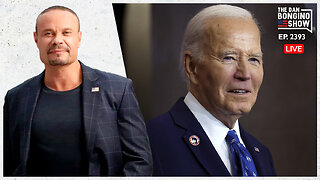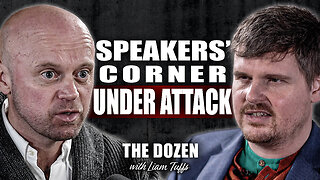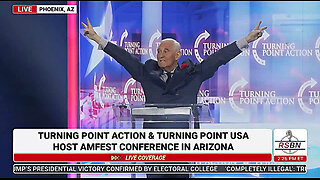Premium Only Content

Episode 1448: Vladimir Lenin "Women and Marxism" verses The Blessed Mother "The Perfect Woman"
I have in several episodes made reference to the Vladimir Lenin's writing on Feminism called "Women and Marxism" it is a collection of Lenin's writings and speeches on women's liberation and their role in the socialist movement. Lenin recognized the importance of addressing gender inequality and the need to incorporate women into the revolutionary struggle. Here is a brief overview of some key points from Lenin's work on this topic:
Women's Liberation: Lenin argued that the struggle for women's liberation was an integral part of the broader socialist revolution. He believed that true social progress could not be achieved without addressing the oppression of women.
Vladimir Lenin's writings on women's liberation emphasized its importance within the broader context of the socialist revolution. Here are some key ideas and excerpts from his work on this topic:
On the Connection Between Women's Liberation and the Socialist Revolution:
"The success of a revolution depends on how much the women take part in it. In other words, it depends on how much the women's question is solved."
Lenin highlighted that women's participation in the socialist revolution was not just desirable but crucial for its success. He argued that solving the "women's question" was a vital aspect of achieving a more just and equitable society.
On the Role of Women Workers:
"We are opposed to the participation of women in parliaments and in the so-called popular representation under capitalism. Why? Because under capitalism women are an oppressed class."
Lenin believed that women workers should play a central role in the struggle for socialism. He argued that their primary focus should be on revolutionary activities and not on seeking representation within a capitalist system that inherently oppressed them.
On Economic and Social Equality:
"Real equality between men and women can only exist when the exploitation of the masses, of the people, is abolished. The task of the working class in this respect is to lead the whole mass of the people away from the bourgeois-democratic prejudices of the equality of men and women as individuals."
Lenin emphasized that true equality between men and women could only be achieved by eliminating the economic and social conditions that perpetuated gender disparities. He saw the working class as the driving force in achieving this goal.
On the Family and Marriage:
"The conditions of women will improve only when we abolish the system of private property and socialize the means of production. The family will no longer be an economic unit, but a private affair."
Lenin envisioned a society where the family structure would be transformed, with the abolition of economic dependencies within marriage. He believed that socialism would lead to a more equal distribution of labor and responsibilities within families.
On Education and Empowerment:
"We must learn to combine all forms of struggle, education, and organization for women workers, as well as for men, in such a way that our work leads to the most rapid development of the independent influence of women."
Lenin stressed the importance of education and organization for women, emphasizing that their independent influence should be nurtured and developed. He believed that educated and empowered women would contribute significantly to the socialist cause.
Lenin's writings on women's liberation reflect his commitment to addressing gender inequality as part of the larger socialist agenda. His ideas influenced the early development of women's rights and gender equality within the context of the Russian Revolution and the broader socialist movement.
Equality: Lenin emphasized the importance of achieving gender equality in all aspects of life, including political, economic, and social spheres. He saw women's participation in the workforce and politics as essential to achieving this equality.
Vladimir Lenin's writings often emphasized the concept of equality as a fundamental principle of socialism and communism. Here are some key ideas and excerpts from his work on the topic of equality:
On Social and Economic Equality:
"Socialists demand social and economic equality for the workers, which means the abolition of social classes and class distinctions, the abolition of all exploitation of man by man."
Lenin believed that socialism aimed at achieving not only political equality but also social and economic equality. This meant the elimination of class distinctions and the end of exploitation in all its forms.
On Class Struggle and Equality:
"Equality is an empty phrase unless it rests on the basis of the material equality of all members of society, unless it continues to be applied by the state, by the government."
Lenin emphasized that true equality could not be achieved solely through rhetoric or ideals; it had to be supported by concrete policies and actions, particularly by the state and government, to address material inequalities.
On Women's Equality:
"Real equality between men and women can only exist when the exploitation of the masses, of the people, is abolished."
Lenin recognized that gender equality was an integral part of overall social equality. He argued that true equality between men and women could only be achieved when the exploitation of the masses was abolished, which was a fundamental goal of socialism.
On Equality in Education:
"Every child, without exception, must be given the opportunity to develop all his aptitudes and capacities, be they great or small, and to choose any career he pleases."
Lenin believed that education should be a tool for achieving equality. He advocated for a system that provided equal educational opportunities to all children, regardless of their social or economic background.
On the Role of the State:
"The working class cannot simply lay hold of the ready-made state machinery and wield it for its own purposes."
Lenin recognized that achieving equality required a transformation of the state apparatus. He argued that the working class should not simply take control of existing state institutions but should create a new state structure that would serve the interests of the working people.
On International Equality and Anti-Imperialism:
"The bourgeoisie of the oppressor nations strives to maintain and fortify the annexation of the oppressed nations; they strive to deepen and extend national oppression."
Lenin's writings also addressed international equality and anti-imperialism. He argued against the oppression of nations by imperialist powers and called for the right to self-determination for oppressed peoples.
These excerpts demonstrate that for Lenin, equality was not a superficial concept but a central tenet of his socialist ideology. He believed that achieving true equality required fundamental changes in social, economic, and political structures, and that these changes were essential for building a more just and equitable society.
Family and Marriage: Lenin discussed how the institution of marriage and the family were influenced by class society and capitalism. He advocated for changes in family structures to promote women's independence and freedom from traditional patriarchal norms.
Vladimir Lenin had specific views on the institution of the family and marriage, which he believed were influenced by class society and capitalism. Here are some key ideas and excerpts from his writings on this topic:
On the Transformation of the Family under Socialism:
"Socialism has transformed woman into a real worker and makes her a free and equal comrade of man. In this field, too, we must keep to our course undeviatingly, finish it, to the end and to the fullest degree."
Lenin argued that under socialism, the family would undergo a transformation. Women would become active participants in the workforce and society, and the traditional patriarchal family structure would evolve into a more egalitarian one.
On Economic Independence for Women:
"The chief thing is to organize women workers, who are the most oppressed, and you will win over the peasant women as well. The chief thing is to organize women workers."
Lenin believed that economic independence was essential for women's liberation. He emphasized the importance of organizing women workers and ensuring their active participation in the workforce.
On the Abolition of Economic Dependence within Marriage:
"A woman worker is being paid equally with a man worker. The woman has not only been emancipated in regard to her family; she has also been made equal to the man on the labor market."
Lenin's vision of socialism included the abolition of economic dependence within marriage. He believed that when women received equal pay for equal work, they would be economically independent and no longer subject to the economic authority of men in the family.
On Divorce and the State's Role:
"Divorce should be permitted at the request of either partner in the marriage, without the necessity of resorting to courts of law, and without the necessity of any ground for divorce."
Lenin advocated for liberal divorce laws that would allow either partner to request a divorce without needing to prove specific grounds. He saw this as a way to empower individuals within marriages and reduce the potential for abusive relationships.
On Women's Emancipation and the Family:
"The family is ceasing to be a unit of the civil code. It is ceasing to be a factor of education, ceasing to be a restriction on the freedom of love."
Lenin believed that as women's emancipation progressed, the traditional family structure would lose its legal and social significance. This would lead to greater freedom in personal relationships and love.
On Childcare and Education:
"We need free education in public nurseries, creches, kindergartens, and children’s homes. We need to learn from the European countries that spend millions on these institutions."
Lenin emphasized the importance of providing free and accessible childcare and education facilities to support working parents, especially women. This would enable women to participate fully in the workforce and society.
In summary, Lenin's views on family and marriage were rooted in his belief that these institutions, as they existed under capitalism, perpetuated gender inequality and economic dependence. He envisioned a socialist society where women were economically independent, and traditional family structures were transformed to reflect greater equality and freedom within personal relationships.
Working Women: Lenin recognized the significant contributions of working-class women to the labor force and the revolutionary movement. He called for equal pay for equal work and better working conditions for women.
Vladimir Lenin recognized the important role of working women in the labor force and their significance in the socialist movement. Here are some key ideas and excerpts from his writings on the topic of working women:
On the Importance of Women in the Workforce:
"The participation of women workers in our economic construction is the way to strengthen the proletarian dictatorship, to blunt the women’s question and place it on the agenda in a new way."
Lenin stressed that women's active participation in the workforce was crucial not only for economic development but also for advancing the goals of the socialist movement. He believed that it was a means to address and resolve the "women's question" and promote gender equality.
On Equal Pay for Equal Work:
"Equal pay for equal work is the demand of justice; but not only the demand of justice. It is a great step towards the solution of the entire problem of woman’s emancipation."
Lenin advocated for equal pay for women and men performing the same work. He saw this as a fundamental step toward achieving gender equality and women's emancipation.
On Workplace Conditions:
"In the sphere of politics and of economics, the factory and the government, we must demonstrate that we are educating and training women workers to be class-conscious and that in our factories there is no differentiation between men and women, nor any privileges for men."
Lenin believed that workplaces should be free from gender-based discrimination. He emphasized the importance of creating an environment where women and men were treated equally and had the same rights and opportunities.
On the Political Role of Working Women:
"The more thoroughly and widely working women are drawn into our work in connection with the Soviet and party bodies, the more successfully shall we achieve the aim of our socialist construction, namely, the full emancipation of women."
Lenin encouraged the active involvement of working women in political and party activities. He believed that their participation would contribute to the success of socialist construction and the emancipation of women.
On Women's Education:
"Our educational work among women must be in the hands of reliable Communists, because we are not only dealing with the question of emancipating women from the family, but also with the question of emancipating them from the influence of the petty bourgeoisie."
Lenin recognized the importance of education for women and the need for committed Communists to lead educational efforts. He saw education as a means to empower women and liberate them from traditional societal norms.
On Organizing Women Workers:
"The chief thing is to organize women workers, who are the most oppressed, and you will win over the peasant women as well. The chief thing is to organize women workers."
Lenin emphasized the organization of women workers, particularly in urban industrial settings. He believed that their organization would have a ripple effect, reaching and influencing women in other sectors of society.
These excerpts reflect Lenin's recognition of the central role of working women in the socialist movement and his commitment to addressing gender inequality in the workplace and society. He believed that the full participation of women in all aspects of economic and political life was essential for achieving socialism and women's emancipation.
Education: Lenin emphasized the importance of education for women, believing that access to education would empower them to participate more actively in society and the revolutionary struggle.
Vladimir Lenin attached great importance to education as a means of achieving socialist goals and fostering a more equitable society. Here are some key ideas and excerpts from his writings on education:
On the Significance of Education:
"Education is the most powerful weapon which you can use to change the world."
Lenin recognized that education was a powerful tool for social change. He believed that an educated populace was essential for building a socialist society.
On Free and Accessible Education:
"We must raise the level of our Soviet public education to that of a mentally developed adult who has the ability to reflect on any subject of social life."
Lenin advocated for free and accessible education for all. He believed that education should not be limited to a privileged few but should be available to every member of society to ensure their mental development and ability to participate in social and political life.
On Equal Opportunities in Education:
"The socialists are absolutely opposed to the schooling of the young generation of workers and peasants to be "hewers of wood and drawers of water" for the rich."
Lenin was against an education system that merely trained individuals for low-paying and menial jobs. He argued for an education system that provided equal opportunities for all, regardless of social or economic background.
On Education for Women:
"We need free education in public nurseries, creches, kindergartens, and children’s homes. We need to learn from the European countries that spend millions on these institutions."
Lenin emphasized the need for education facilities that supported working parents, particularly women. He advocated for the establishment of public nurseries and childcare centers to ensure that women could participate fully in the workforce.
On Political Education:
"Without a revolutionary theory, there cannot be a revolutionary movement."
Lenin stressed the importance of political education for the working class. He believed that a strong theoretical foundation was necessary for effective revolutionary action.
On Teachers and Education Workers:
"Teachers are the engineers of the soul. Our entire knowledge has grown out of them. No other profession has any influence over society."
Lenin recognized the crucial role of teachers and education workers in shaping the minds of future generations. He saw them as instrumental in building a socialist society.
On Cultural Revolution:
"We must strive for the closest possible amalgamation of literature and science with the working-class movement, and for the organization of truly mass and truly class institutions of culture."
Lenin believed in a cultural revolution that would integrate literature, science, and education with the working-class movement. He saw culture as an integral part of the socialist transformation.
On Education in a Socialist Society:
"In socialist society education will be a part of the public work, and will be under the control of the state. There will be no means of teaching other than public means."
Lenin envisioned that education in a socialist society would be a public service, controlled by the state and accessible to all. Private education, in his view, would be replaced by public education.
These excerpts reflect Lenin's commitment to education as a tool for social change and his vision of a comprehensive and accessible educational system that would empower individuals and contribute to the development of a socialist society.
Political Participation: Lenin encouraged women's involvement in politics and the Communist Party. He believed that women should have the same political rights and opportunities as men.
Vladimir Lenin believed in the active political participation of the working class as a means to achieve socialist goals. Here are some key ideas and excerpts from his writings on political participation:
On the Role of the Working Class in Politics:
"The working class alone can and must lead the struggle of the whole people for their emancipation from the yoke of capital."
Lenin believed that the working class had a central role to play in leading the struggle for social and political change. He saw the working class as the driving force behind the revolution and the establishment of a socialist society.
On Workers' Political Organization:
"The working class must be the vanguard, the leader of all the laboring and exploited people."
Lenin emphasized the need for the working class to organize politically and take a leading role in the broader labor and socialist movements. He believed that workers' organizations should be at the forefront of political change.
On the Need for a Strong Communist Party:
"Without a revolutionary party, without a party built on the Marxist revolutionary theory and in the Marxist revolutionary spirit, it is impossible to lead the proletarian revolution to victory."
Lenin stressed the importance of a well-organized and ideologically driven Communist Party as the vanguard of the working class. He believed that such a party was essential for guiding the revolution to success.
On the Dictatorship of the Proletariat:
"The dictatorship of the proletariat is a persistent struggle—bloody and bloodless, violent and peaceful, military and economic, educational and administrative—against the forces and traditions of the old society."
Lenin believed that the working class, once in power, needed to maintain a dictatorship of the proletariat to protect the gains of the revolution. This dictatorship was seen as a temporary phase of transition toward a classless society.
On the Importance of Political Education:
"Political consciousness can be brought to workers only from the outside, that is, only from outside the economic struggle, from outside the sphere of relations between workers and employers."
Lenin recognized the need to bring political consciousness to workers and believed that this required education and organization to go beyond immediate economic concerns and engage in broader political struggles.
On the Alliances with Other Oppressed Groups:
"The class-conscious workers must constantly and unremittingly develop the widest and most selfless activity, win the widest sympathy, support, and a leading place in the democratization of the whole political and social system."
Lenin emphasized the importance of building alliances with other oppressed groups and fostering solidarity among various segments of society to achieve common political goals.
On the Rights of Nations to Self-Determination:
"We must recognize the right of nations to self-determination and the equality of nations in the family of nations."
Lenin advocated for the right of oppressed nations to determine their own political status, which he saw as a key principle of international politics and the struggle for socialism.
These excerpts reflect Lenin's belief in the active political participation of the working class and the role of a strong and ideologically driven Communist Party in guiding the revolutionary process. He saw politics as a central arena for achieving socialist change and believed that the working class should play a leading role in shaping the course of history.
It's important to note that while Lenin's writings on women and feminism were progressive for their time, they are also seen through the lens of his broader Marxist and socialist ideology. Some feminist scholars have critiqued aspects of his approach, particularly regarding the intersection of class and gender.
Lenin's writings on women and Marxism are significant historical documents that reflect the evolving discussions about gender and social equality within the context of the early 20th-century socialist movement.
So you are probably wondering why did I cover this matter? It this simple. Lets go to the year before Lenin wrote these documents on women.
Our Lady of Fatima during the July 13, 1917 apparition to the three children, Lucia, Francisco, and Jacinta:
You have seen hell where the souls of poor sinners go. To save them, God wishes to establish in the world devotion to my Immaculate Heart. If what I say to you is done, many souls will be saved and there will be peace. The war is going to end; but if people do not cease offending God, a worse one will break out during the pontificate of Pius XI. When you see a night illumined by an unknown light, know that this is the great sign given you by God that He is about to punish the world for its crimes, by means of war, famine, and persecutions of the Church and of the Holy Father.
To prevent this, I shall come to ask for the consecration of Russia to my Immaculate Heart, and the Communion of Reparation on the First Saturdays. If my requests are heeded, Russia will be converted, and there will be peace; if not, she will spread her errors throughout the world, causing wars and persecutions of the Church. The good will be martyred; the Holy Father will have much to suffer; various nations will be annihilated. In the end, my Immaculate Heart will triumph. The Holy Father will consecrate Russia to me, and she shall be converted, and a period of peace will be granted to the world."
The womans feminist movement of the 1970’s to the present day is a construct of communism, communism is a contruct of satan. Sadly many women too satan bait hook line and sinker and have become as Karl Marx called them “Useful Idiots”. Karl Marx's work "Critique of Hegel’s Philosophy of Right," published in 1844. He said:
"Religious suffering is, at one and the same time, the expression of real suffering and a protest against real suffering. Religion is the sigh of the oppressed creature, the heart of a heartless world, and the soul of soulless conditions. It is the opium of the people.
The abolition of religion as the illusory happiness of the people is the demand for their real happiness. To call on them to give up their illusions about their condition is to call on them to give up a condition that requires illusions. The criticism of religion is, therefore, in embryo, the criticism of that vale of tears of which religion is the halo."
As the demon said in nefarious – you made that one up yourself we had nothing to do with it.
This message is a central part of the Fatima prophecies and has been the subject of much discussion and interpretation within the Catholic Church and beyond.
-
 51:59
51:59
The Dan Bongino Show
5 hours agoDemocrat Donor Admits The Scary Truth (Ep. 2393) - 12/23/2024
569K1.68K -
 2:32:15
2:32:15
Matt Kohrs
16 hours agoRumble CEO Chris Pavlovski Talks $775M Tether Partnership || The MK Show
90.7K27 -
 28:23
28:23
Dave Portnoy
16 hours agoDavey Day Trader Presented by Kraken - December 23, 2024
112K35 -
 59:29
59:29
BonginoReport
7 hours agoTrump, Murder Plots, and the Christmas Miracle: Evita + Jack Posobiec (Ep.110) - 12/23/2024
126K116 -
 2:59:14
2:59:14
Wendy Bell Radio
10 hours agoNothing To See Here
106K67 -
 2:12:18
2:12:18
TheDozenPodcast
1 day agoIslam vs Christianity: Bob of Speakers' Corner
99.8K24 -
 14:36
14:36
The StoneZONE with Roger Stone
1 day agoRoger Stone Delivers Riveting Speech at Turning Point’s AMFEST 2024 | FULL SPEECH
121K28 -
 18:59
18:59
Fit'n Fire
16 hours ago $7.91 earnedZenith ZF5 The Best MP5 Clone available
83.6K3 -
 58:34
58:34
Rethinking the Dollar
1 day agoTrump Faces 'Big Mess' Ahead | RTD News Update
60K5 -
 5:35
5:35
Dermatologist Dr. Dustin Portela
1 day ago $3.22 earnedUnboxing Neutrogena PR Box: Skincare Products and Surprises!
72K5